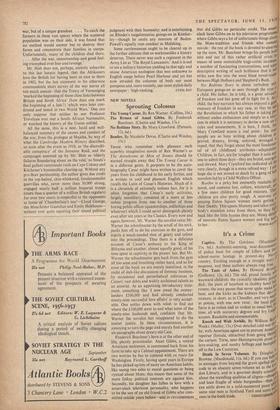NEW NOVELS
Sprouting Colossus
THOSE who remember with pleasure such superbly imaginative novels of Rex Warner's as The Aerodrome or Men of Stones should be warned straight away that The Young Caesar is in a different genre. It purports to be the auto- biography Caesar might have written to cover the years from his childhood to his early forties, and is written in cool and pleasant English which recalls the Latin of Cesar's Histories. Much of it is a chronicle of extremely tedious fact, for it is often forgotten that Caesar's early activities, largely unmilitary, consisted of a more or less sedate progress from one to another of those boring public offices (qux-storships, cedileships and whatever) which I could never distinguish plainly even after ten years at the Classics. Every now and again, however, Mr. Warner the novelist takes Mr. Warner the schoolmaster by the scruff of the neck, packs him off to do his exercises in the gym, and injects a much-needed shot of gaiety and colour into the proceedings. Thus there is a delicious account of Cxsar's embassy to the King of Bithynia and another, almost equally good, of his time spent in captivity in the pirates' lair. But Mr. Warner the schoolmaster gets back from the gym all too soon and breathing rather hard, and so for most of the book we are merely tantalised, in the midst of slab-like discussions of forensic business, by occasional and parenthetical references to Cxsars' vast debts and widely acclaimed talents as an amorist. As an appetising introductory state- ment, something like 'I now owed the money- lenders £100,000 and had already conducted ninety-nine successful love affairs' is very accept- able. One settles down with relish to find out where the £100,000 went to and what some of the ninety-nine husbands said, confident that Mr. Warner the novelist has reappeared to do the matter justice. In these circumstances, it is annoying to turn the page and merely find another six paragraphs about dreary old Cato.
Frederick Buechner's hero is at the other end of life, plainly proconsular. Ansel Gibbs, a retired American statesman, is summoned back from his farm to take up a Cabinet appointment. There are two worries he has to contend with en route for Washington. Firstly, having spent years in Europe he has picked up lots of nasty un-American habits, like seeing two sides to moral questions or being cynical about Mom; this means that some of the more folksy political interests are against him. Secondly, his daughter has fallen in love with a smart-aleck television personality, who happens to be the son of an old friend of Gibbs who com- mitted suicide years before—and in circumstances aleck lures Gibbs on to his television programme, where Gibbs says a lot of unfortunate things about the Mom-tradition and friends who commit
suicide : the rest of the book is devoted to clearing up the mess. Mr. Buechner brings his people both into and out of this rather artificial crisis by
means of some memorable tragi-comic incidents, a number of fascinating conversations, and some i descriptive writing of such brilliance that it strike new fire into the most blase novel-reader between High Holborn and Shepherd's Bush. mid' European Bedtime Story is about turbulent triai European goings-on as seen through the eyes ° a child. His father, he is told, is a great advoeald of freedom and has gone off to fight for it. As $, child, the boy-narrator has always enjoyed a 000 measure of freedom in any case, so that he sees the Revolution in which his father is taking pat` without undue enthusiasm and simply as a sita°i tion in which it is necessary to devise a new set of rules and amusements. It is here, I think, that Mary Crawford scores a real point : for nin't people are so busy writing about children de' prayed, dreamy, loving, unloved, wronged e'r raped, that they forget about the most fundarne tal of all childhood attributes—adaptabil0 Children, in fact, are far tougher than it suits one to admit these days—they are brutal, energetic and shrewd. Mary Crawford has indicated all this very clearly, though in a more refined way : I only hope she is not stoned to death by a gang of lady novelists led by a Child Welfare Officer. Bonfire is a jerky but eminently readable find novel, and contains lust, culture, witchcraft, one a few more children for good measure. TO children are also pretty tough. A neurotic ant preying Eaton Square woman starts getting d, their Daddy. This upsets Mummy and takes evert' body's attention away from them, so they fi10 0 back like the little hyenas they are. Messy deMlis of neurotic Eaton Square woman and big sue


































 Previous page
Previous page